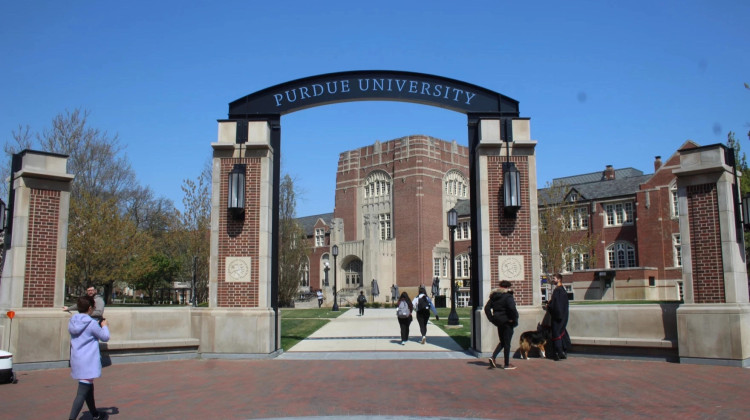
Ivy Tech Community College trustees voted 11-0 Wednesday afternoon to hire for Lt. Gov. Sue Ellspermann as the school's president starting July 1.
Eric Weddle / WFYI Public MediaThe Ivy Tech Community College board of trustees unanimously picked former Lt. Governor Sue Ellspermann as the college’s next president in an 11-0 vote Wednesday afternoon. Ellspermann, once a director at a state university research center, will succeed the retiring Tom Snyder who has led the school since 2007.
There wasn’t much discussion between board members during a brief public meeting where the votes were cast.
But when Ellspermann was introduced to the media as the incoming president, she quickly expounded on many of the challenges facing Ivy Tech, such as too few guidance counselors; low graduation rates; and a mismatch of course offerings with the needs of Indiana employers.
"We are not satisfied with the full-time student completions where one in four full-time students will graduate in six years, and one in 20 for the time allotted for associated degrees,” she told a packed room on the Indianapolis campus with Ivy Tech chancellors and staff. “We may not reach 100 percent but we can not rest until most of our students are reaching that completion on their time."
The announcement ends an eight months-long search for a new president of the nation's largest singly accredited statewide community college. Ellspermann was one of 34 people seriously considered for the job and one of three finalists.
Though it had seemed Ellspermann, a Republican, was a favorite from the beginning.
She was encouraged to apply for the job in August by an Ivy Tech trustee, she explained Wednesday. Aftering informing Gov. Mike Pence of her interest in the job, the news became public in December. Pence’s office described her as “uniquely qualified” to be the college’s new president.
When Ellspermann resigned in March, Pence further praised her abilities to lead the college.
Wednesday, she refuted rumors that a rift with Pence over social issues led her to seek the leadership at the college.
“I think there will always be people who will want there to be a deeper or another story to it,” she said. “But it really is, and I hope the Ivy Tech folks in the room understand, this is really something I consider a tremendous honor.”
Board chairwoman Paula Hughes said political pressure did not play into the decision to choose Ellspermann over other finalists. Ivy Tech trustees are appointed by the sitting governor.
Rather, Hughes said, Ellspermann was the most qualified.
"I think the state is going to see what we have seen and in a different role for Dr. Ellspermann,” she said. “You've seen her as Lieutenant Governor I think you should just stand back and see what she can do as president of Ivy Tech."
The challenges Ellspermann described for Ivy Tech during the Wednesday’s event are not new.
Enrollment, which reached peaked at 2012-13 at 180,000 students taking at least one course has dropped nearly 5 percent in 2014.
Last year, the Indiana General Assembly ordered the state Commission For Higher Education to review Ivy Tech programs with low graduation rates and eliminate or restructure programs.
The commission found that after six years only 24 percent of students have graduated and 41 percent are still enrolled. Twenty-five percent of Ivy Tech students who transferred to four-year college, such as Purdue or Indiana universities, earned a bachelor’s degrees within six years.
The report also found that Ivy Tech “lacks the data systems and resources necessary to track labor market and job placement outcomes comprehensively.”
The college is under pressure to use labor market data to base its course offerings and programs on. Business leaders and state lawmakers, like Pence, expect Ivy Tech to play a major role in preparing the state’s workforce.
Ellspermann agreed, saying the alignment of programs and the workforce was even more pressing than the ongoing “herculean effort” to improve completion rates.
“Employers are struggling to find qualified, skilled employees for jobs,” she said. “Today, we can measure how full our clssrooms are but we don’t know if that is aligned to the real needs of our employers.”
Teresa Lubbers, higher education commissioner, said in a statement that Ellspermann understands the state’s education and workforce needs and she will “bring a new era of vision and goal-focused action in service to Hoosier students and our state’s workforce.”
Ellspermann’s contract with Ivy Tech has yet to be negotiated but it’s expected to be brought to the college trustees in June for approval, said Hughes. Snyder’s annual salary is $300,000.
Before Ellspermann was elected as the State Representative for District 74 in 2010, she had various higher education experience. She was the founding Director of the Center of Applied Research and Economic Development at the University of Southern Indiana from 2006 to 2012. She has a doctorate in industrial engineering.
The identity of the other finalist for the job was not disclosed by the trustees who opted for a closed search as allowed by state law.
Final interviews were conducted during the past three weeks with three finalists -- including acclaimed Tennessee higher education executive James King who was knocked out of the running.
Trustee Stewart McMillan, of Valparaiso, lauded the search committee’s work in identifying the final candidates.
“Candidates that made for me the most difficult hiring decisions I’ve made in my 40 year career,” he said about choosing Ellspermann. "In the end, it came for me down to: who could we get up to speed fastest and move the college forward."
Contact WFYI education reporter Eric Weddle at eweddle@wfyi.org or call (317) 614-0470. Follow on Twitter: @ericweddle.
 DONATE
DONATE







 Support WFYI. We can't do it without you.
Support WFYI. We can't do it without you.